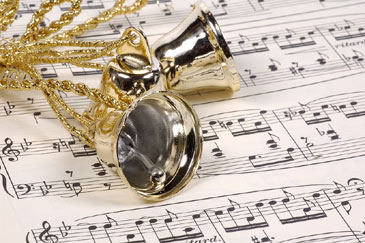Christmas Carols

Songs for religious and secular Christmas carolers alike
by Liz Olson
 Related Links |
Christmas carols are synonymous with the holiday season and can invoke the spirit of Christmas in even the most Scrooge-like individuals. Indeed, Bing Crosby crooning “White Christmas,” Alvin’s squeaky “Chipmunk Christmas Song,” or a group of carolers singing “We Wish You a Merry Christmas” can bring holiday warmth on the coldest December day.
The Origin of the Christmas Carol
The first carols were religious hymns written about the birth of Christ and included themes such as the nativity, peace, angels, baby Jesus, and the North Star. Beginning with St. Francis of Assisi (1182-1226), carols have been sung in church to celebrate the birth of Jesus Christ. It’s said that St. Francis was the first person to set up a manger scene in a church—a model of the stable in which baby Jesus was delivered that included farm animals, shepherds, and three singing wise men.
Christmas Carols around the World
The oldest printed collection of Christmas carols was published in 1521 by Jan van Wynkyn, an Englishman. The book included the “Boar’s Head Carol,” which is still sung today.
“Silent Night” was written by an Austrian priest named Fr. Joseph Mohr in the early 19th century and was later translated into hundreds of languages. The popular version of “O Come, All Ye Faithful” was written by Canon Frederick Oakeley of London in 1852, but the origins of the song date back to the 13th century Franciscan St. Bonaventure. A Latin version was also popular in 1744 at vaudeville shows in Paris.
American Carols
“O Little Town of Bethlehem” was written by Phillip Brooks of Boston, Massachusetts—a preacher in the 19th century who became Episcopal Bishop of Massachusetts in 1891. He wrote the famous words of “O Little Town of Bethlehem” three years after he journeyed to the Holy Land and spent Christmas Eve in Bethlehem. Brooks gave the words to his church organist who set them to music on Christmas in 1868. “We Three Kings of Orient Are” dates back to 1857 when John Henry Hopkins wrote the carol for a Christmas pageant at the General Theological Seminary in New York City.
Modern Carols
In recent history, carols have come to tell about not only the nativity, but also secular holiday traditions, including reindeer, snowmen, Santa Claus, and more. Some popular nonreligious carols include Mariah Carey’s “All I want for Christmas Is You,” “Santa Claus Is Coming to Town” by Bruce Springsteen, “Blue Christmas” by Elvis Presley, and “Jingle Bell Rock” by Hall and Oates.
- More from Major Holidays







